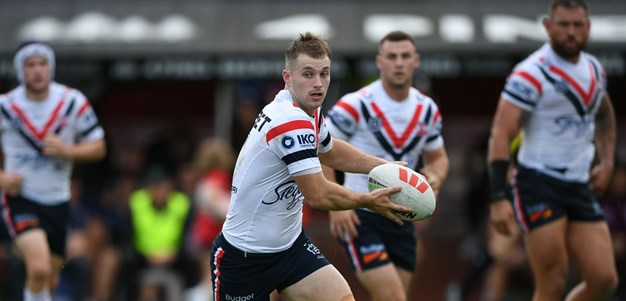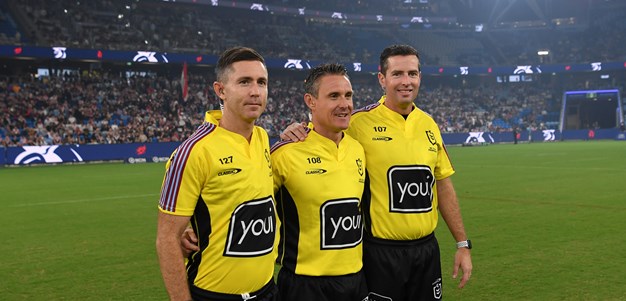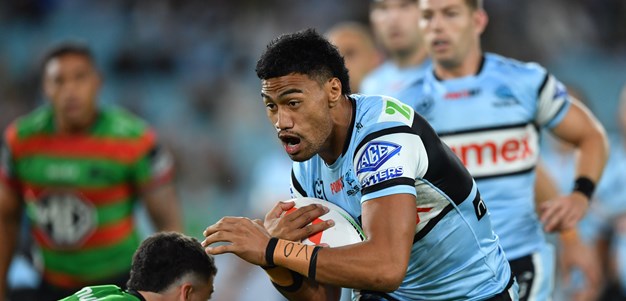Two of the most experienced coaches in the NRL today have welcomed the shift from 10 to eight interchanges in 2016 but insist the game must go further in order to promote the free-flowing rugby league the NRL are looking for.
Ahead of their two teams meeting at Suncorp Stadium on Friday night Broncos coach Wayne Bennett and his Titans opposite Neil Henry both expressed their support for the reduction but predict the number will eventually be cut to six per team per game.
Bennett, who is a member of the NRL Competition Committee that signed off on the adjustment to the interchange rule and the introduction of the 'shot clock' for scrums and drop-outs believes we won't see a significant change in how the game is played until further cuts are made.
"The interchange won't have the impact that everybody thinks it's going to have, in the short term. It's a good move; it's a move in the right direction," Bennett said on Thursday.
"There's going to be issues with the change. It's the way it just works. 10 to eight is not a big hit at the moment. It'll finish up at six, I've got no doubt about that.
"Two interchanges is not really going to impact on the way we play right now. Most of us are probably only using eight or nine interchanges a game, that's pretty well worked out. It's when it gets to six, that'll be the real hurt time.
"The biggest fear with it all, and my only fear is when you've got a bad day of injuries, particularly even the head-bin. While it's a good concept and I'm really happy with it, if you lose a player for the head-bin after 15 minutes well that's an interchange gone.
"It can get a little bit thrown out on you but if it's a normal day, all your players healthy, it's manageable."
In his first full season at the Titans after previous stints at the Raiders and Cowboys, Henry also doesn't believe the change for 2016 will have a dramatic effect but that a shift to six would open the game up further.
"Most teams don't tend to run out their 10 [interchanges] all the time anyway. It's normally the last five minutes you might use your last interchange or two but I welcome it," Henry said.
"I think we're on the way from probably going from eight down to six which I think is probably where it should get to and that might lessen the fresh players and the collisions out there for 80 minutes.
"That might bring a bit of fatigue in and maybe open up the role for a utility to be there on the bench rather than having four fresh forwards.
"I welcome it and the shot clock too is a good innovation. I think we need to find ways to speed up the game and not have as many stoppages as well."
A 'shot clock' at scrums and drop-outs will also be used to reduce stoppages and make fatigue more of a factor but Bennett suggested that it should not only be the players who are put on the clock.
"In the interim we're going to have to fix up the video referee," said Bennett, who will coach his 726th premiership game on Friday night.
"That can give you anywhere up to a minute to two minutes recovery and that's all these guys need, a couple of minutes. That's going to have to be sorted out. They should be put on a shot clock, to be honest with you.
"We've got to put a time limit on it, in my opinion, and come up with a system there that keeps it to a certain time and we've got to live with the decision. That's what's great about sport. Sport is not a science, it's imperfect.
"I'm serious. We're all being made accountable to try and give us a game which we all want to see being played, which is not far off at the moment."
Titans captain and Test and Origin forward Nate Myles also welcomed the reduction in interchanges, suggesting it will allow the "true footballers" to once again come to the fore.
"It will allow the true footballers of the game to come out and I think that's what fans want to see," said Myles. "They want to see some good football being played; they don't want to see eight guys in and around a tackle just rolling around on the floor.
"They want to see some fast-flowing football and hopefully that creates it."



